The vacuum rated motors market is valued at USD 3,439.8 million in 2025 and is expected to reach USD 5,710.7 million by 2035, growing at a CAGR of 5.2%. From 2021 to 2025, the market is expected to show steady progress, starting at USD 2,669.6 million in 2021 and rising to USD 3,439.8 million by 2025. Annual increments reflect gradual but consistent growth, with intermediate values moving through USD 2,808.4 million, USD 2,954.5 million, USD 3,108.1 million, and USD 3,269.7 million.
This phase is characterized by increasing demand across various industries, including industrial automation, robotics, aerospace, and electronics. Technological advancements in motor efficiency and performance are key drivers in the early part of the forecast period.
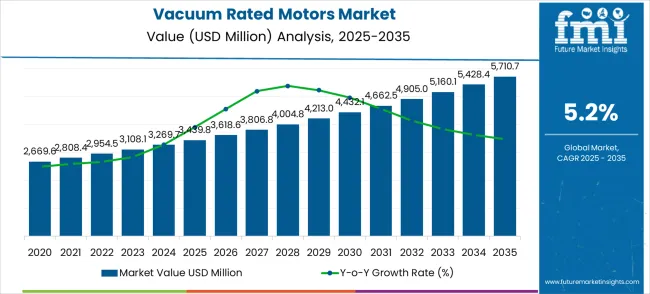
From 2026 to 2030, the market continues to grow, advancing from USD 3,439.8 million to USD 4,432.1 million. This period witnesses more substantial adoption in applications requiring high-vacuum environments, including semiconductor manufacturing, material handling, and medical equipment. The demand for highly efficient, durable, and reliable motors has contributed to steady growth over the years. Between 2031 and 2035, the market is expected to reach USD 5,710.7 million, with intermediate values progressing through USD 4,662.5 million, USD 4,905.0 million, and USD 5,160.1 million. The strong momentum in this phase is driven by innovations in motor technology, expanding industrial automation, and the growing demand for high-performance motors across various sectors, resulting in significant market share gains.
| Metric | Value |
|---|---|
| Market Value (2025) | USD 3,439.8 million |
| Market Forecast Value (2035) | USD 5,710.7 million |
| Market Forecast CAGR | 5.2% |
The vacuum equipment market is the largest contributor, accounting for about 30–35%, as vacuum-rated motors are critical components in vacuum pumps, which are used extensively in industrial and scientific applications that require high levels of vacuum for processes such as material handling, research, and manufacturing. The industrial machinery market follows closely, contributing around 20–25%, with vacuum-rated motors being essential for operations in manufacturing systems, where precision and efficiency are crucial for processes like packaging, assembly, and material processing. The automotive industry accounts for approximately 15–18%, as vacuum-rated motors are used in various automotive applications, such as brake boosters, HVAC systems, and power-assisted steering, which require motors that can perform reliably under vacuum conditions.
The electronics and semiconductor market contributes about 10–12%, where vacuum-rated motors are integral in maintaining the vacuum environment in semiconductor fabrication processes and other precision manufacturing. The energy and power generation market represents approximately 8–10%, as vacuum-rated motors are used in various systems that require high efficiency and durability, such as in power plant operations and renewable energy technologies.
Market expansion is being supported by the rapid increase in semiconductor manufacturing capacity worldwide and the corresponding need for vacuum-compatible motion control systems that provide superior performance and operational reliability in high-vacuum environments. Modern semiconductor fabrication facilities rely on consistent equipment performance and precision motion control to ensure optimal manufacturing yields including wafer processing, lithography systems, and specialized semiconductor applications. Even minor contamination or performance variations can result in substantial production losses requiring comprehensive vacuum-compatible equipment solutions to maintain optimal manufacturing standards and operational performance.
The growing complexity of semiconductor manufacturing processes and increasing demand for ultra-high precision motion control solutions are driving demand for vacuum rated motors from certified manufacturers with appropriate vacuum compatibility capabilities and technical expertise. Semiconductor manufacturers and equipment suppliers are increasingly requiring documented vacuum performance and contamination control to maintain production quality and manufacturing effectiveness. Industry specifications and cleanliness standards are establishing standardized vacuum processing procedures that require specialized motor technologies and trained maintenance personnel.
The vacuum rated motors market is entering a transformative growth phase driven by increasing semiconductor complexity, rising demand for advanced manufacturing equipment, and technological advancement. As semiconductor manufacturers, aerospace companies, and research institutions across both developed and emerging markets seek solutions that deliver superior precision, vacuum compatibility, and comprehensive motion control capabilities, vacuum rated motors are evolving from specialized components to critical enablers of next-generation manufacturing systems integrated with smart sensors, predictive maintenance capabilities, and advanced control algorithms.
Rising semiconductor production and advanced manufacturing adoption in Asia-Pacific, Latin America, and Middle East & Africa amplify demand, while manufacturers are advancing innovations in magnetic materials, bearing technologies, and contamination control features. Pathways like IoT integration, predictive maintenance capabilities, and AI-enabled control systems promise strong margin uplift, especially in mature markets. Geographic expansion and localization will capture volume growth, particularly where semiconductor manufacturing infrastructure is developing or advanced manufacturing programs are expanding. Technological advancement pressures, precision manufacturing requirements, and Industry 4.0 integration provide structural market support.
The market is segmented by motor type, application, and region. By motor type, the market is divided into stepper motor, servo motor, and others. Based on application, the market is categorized into semiconductor manufacturing, aerospace and military industry, and others. Regionally, the market is divided into North America, Europe, East Asia, South Asia & Pacific, Latin America, and Middle East & Africa.
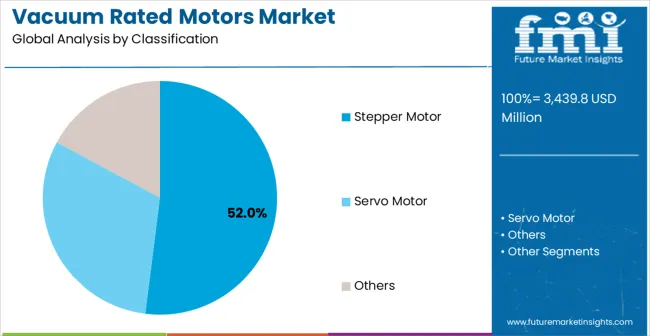
In 2025, the stepper motor segment is projected to capture around 52% of the total market share, making it the leading motor type category. This dominance is largely driven by the widespread adoption of stepper motors in semiconductor manufacturing equipment that requires precise positioning and accurate motion control in vacuum environments. The stepper motor segment is particularly favored for its ability to provide reliable positioning control without feedback systems, ensuring operational simplicity and cost-effectiveness for vacuum processing equipment. Semiconductor manufacturers, equipment suppliers, automation system integrators, and research facilities increasingly prefer stepper motor technology, as it meets precision positioning requirements without imposing excessive complexity or maintenance demands in vacuum environments. The availability of well-established vacuum-compatible designs, along with comprehensive technical support and application expertise from leading manufacturers, further reinforces the segment's market position. This motor type benefits from consistent demand across regions, as it is considered a proven solution for applications requiring precise positioning in vacuum environments. The combination of positioning accuracy, operational reliability, and vacuum compatibility makes stepper motors a preferred choice, ensuring continued popularity in the vacuum equipment market. Advanced encoder integration and enhanced vacuum rating capabilities continue to drive adoption among professional semiconductor and aerospace manufacturers seeking superior positioning performance.
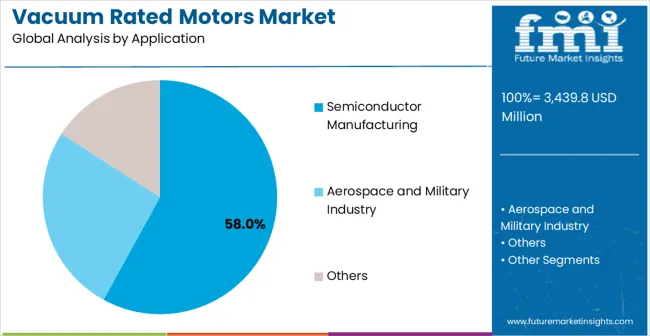
The semiconductor manufacturing segment is expected to represent 58% of vacuum rated motors demand in 2025, highlighting its position as the most significant application sector. This dominance stems from the critical importance of precision motion control in semiconductor fabrication processes, where consistent positioning accuracy and contamination-free operation are essential to maintaining production yields and wafer quality. Semiconductor manufacturing applications often feature ultra-high vacuum environments that require continuous precise motion control throughout complex processing sequences, demanding reliable and contamination-free motor systems. Vacuum rated motors are particularly well-suited to semiconductor applications due to their ability to provide precise positioning and smooth operation in high-vacuum environments without introducing contaminants or particle generation. As semiconductor fabrication facilities expand globally and emphasize advanced node production capabilities, the demand for vacuum rated motors continues to rise. The segment also benefits from heightened focus on manufacturing automation initiatives, where semiconductor manufacturers are increasingly prioritizing precision motion control and contamination prevention as key components of comprehensive yield optimization programs. With semiconductor companies investing in advanced process equipment and manufacturing efficiency enhancement, vacuum rated motors provide an essential solution to maintain high-performance fabrication capabilities. The growth of advanced semiconductor manufacturing programs, coupled with increased focus on yield optimization and contamination control, ensures that semiconductor manufacturing will remain the largest and most stable demand driver for vacuum rated motors in the forecast period. Enhanced precision capabilities and improved contamination control features continue to strengthen the segment's market position.
The Vacuum Rated Motors market is advancing steadily due to increasing semiconductor manufacturing complexity and growing recognition of vacuum-compatible motion control technology advantages over conventional motor solutions in specialized environments. The market faces challenges including higher costs compared to standard atmospheric motors, need for specialized design and materials for vacuum compatibility, and varying performance requirements across different vacuum levels and applications. Technology advancement efforts and vacuum compatibility optimization programs continue to influence product development and market adoption patterns.
The growing development of advanced magnetic materials and specialized bearing systems is enabling improved performance characteristics with enhanced vacuum compatibility and extended operational life. Enhanced magnetic technologies and optimized bearing designs provide superior motor performance while maintaining strict contamination control standards required for vacuum environments. These technologies are particularly valuable for semiconductor and aerospace applications that require reliable motor performance supporting extensive production operations with consistent precision and contamination-free operation.
Modern vacuum rated motor manufacturers are incorporating advanced control electronics and comprehensive monitoring systems that enhance performance optimization and predictive maintenance capabilities. Integration of advanced sensor technologies and optimized control algorithms enables superior motion control results and comprehensive equipment monitoring capabilities. Advanced control features support operation in diverse vacuum environments while meeting various precision requirements and monitoring specifications, including semiconductor fabrication, space simulation systems, and specialized research applications.
The continuous development of advanced materials and surface treatment technologies is reducing outgassing characteristics while maintaining consistent motor performance throughout extended vacuum exposure periods. Advanced material optimization and intelligent surface engineering provide reduced contamination capabilities that support comprehensive vacuum processing activities without performance degradation. These contamination control innovations are particularly valuable for semiconductor manufacturing conducting ultra-clean processing operations where material compatibility and contamination prevention are essential for effective production and product quality maintenance.
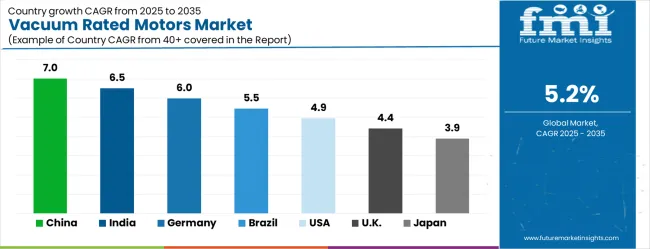
| Country | CAGR (2025-2035) |
|---|---|
| China | 7.0% |
| India | 6.5% |
| Germany | 6.0% |
| Brazil | 5.5% |
| United States | 4.9% |
| United Kingdom | 4.4% |
| Japan | 3.9% |
The vacuum rated motors market is growing rapidly, with China leading at a 7.0% CAGR through 2035, driven by strong semiconductor manufacturing expansion and increasing adoption of advanced fabrication equipment. India follows at 6.5%, supported by rising semiconductor infrastructure development and growing awareness of precision manufacturing technologies. Germany grows steadily at 6.0%, integrating advanced vacuum motor systems into its established semiconductor and aerospace manufacturing infrastructure. Brazil records 5.5%, emphasizing manufacturing modernization and technology advancement initiatives. The United States shows solid growth at 4.9%, focusing on semiconductor innovation and manufacturing efficiency enhancement. The United Kingdom demonstrates steady progress at 4.4%, maintaining established vacuum technology applications. Japan records 3.9% growth, concentrating on technology refinement and precision optimization.
The report covers an in-depth analysis of 40+ countries, with top-performing countries highlighted below.
Revenue from vacuum rated motors in China is projected to exhibit the highest growth rate with a CAGR of 7.0% through 2035, driven by rapid expansion of semiconductor manufacturing infrastructure and increasing demand for advanced fabrication equipment. The country's growing focus on semiconductor self-sufficiency and expanding chip production capacity are creating significant demand for precision vacuum motor solutions. Major semiconductor manufacturers and equipment suppliers are establishing comprehensive supply networks to support the increasing requirements of fabrication facilities and research institutions across wafer processing and advanced packaging applications. Government semiconductor development initiatives are supporting establishment of modern fabrication capabilities and advanced vacuum processing systems, driving demand for sophisticated vacuum rated motor technology throughout major semiconductor clusters and manufacturing corridors. Semiconductor manufacturing modernization programs are facilitating adoption of precision vacuum motor technology that enhances fabrication effectiveness and yield standards across production networks. The Chinese government's commitment to achieving semiconductor technology leadership and reducing import dependence is accelerating investments in advanced manufacturing equipment including vacuum rated motors. Urban technology development projects and integrated circuit initiatives are incorporating sophisticated vacuum processing systems that require high-precision motor capabilities. Commercial semiconductor expansion and technology advancement programs are creating additional demand for professional-grade vacuum rated motor equipment that meets international performance standards and reliability requirements.
Revenue from vacuum rated motors in India is expanding at a CAGR of 6.5%, supported by increasing semiconductor manufacturing development and growing awareness of precision vacuum motor technology benefits. The country's expanding semiconductor infrastructure and rising manufacturing capability standards are driving demand for professional-grade vacuum motor solutions. Semiconductor companies and equipment manufacturers are gradually implementing advanced vacuum rated motor technology to maintain fabrication standards and operational effectiveness. Manufacturing sector growth and infrastructure development are creating opportunities for suppliers that can support diverse precision requirements and vacuum compatibility specifications. Professional training and technology adoption programs are building technical expertise among manufacturing personnel, enabling effective utilization of vacuum rated motor technology that meets fabrication standards and precision requirements across industrial regions. India's rapid semiconductor development and increasing electronics manufacturing are intensifying the need for effective vacuum processing and precision motion control capabilities. National semiconductor development programs and technology park construction projects are establishing comprehensive fabrication systems that require advanced vacuum motor equipment. State government initiatives focusing on manufacturing improvement and technology advancement are driving procurement of modern vacuum rated motor technology for semiconductor and electronics companies. The growing emphasis on precision manufacturing and technology adoption is supporting adoption of internationally certified vacuum motor systems.
Demand for vacuum rated motors in Germany is projected to grow at a CAGR of 6.0%, supported by the country's emphasis on precision manufacturing and advanced vacuum technology adoption. German semiconductor and aerospace manufacturers are implementing sophisticated vacuum rated motor systems that meet stringent performance requirements and quality specifications. The market is characterized by focus on motor precision, operational reliability, and compliance with comprehensive manufacturing quality standards. Manufacturing industry investments are prioritizing advanced vacuum motor technology that demonstrates superior performance and reliability while meeting German engineering and quality standards. Professional certification programs are ensuring comprehensive technical expertise among manufacturing personnel, enabling specialized vacuum motor capabilities that support diverse precision manufacturing applications and operational requirements across industrial networks. Germany's commitment to maintaining the highest manufacturing and engineering standards in Europe drives continuous investment in cutting-edge vacuum motor technology. The country's comprehensive precision manufacturing infrastructure requires sophisticated vacuum motor equipment that meets strict performance and quality control standards. Integration with digital manufacturing systems and automated production networks is creating demand for advanced vacuum rated motor technology with enhanced connectivity capabilities. Regional manufacturing companies are modernizing their precision capabilities through procurement of state-of-the-art vacuum motor equipment that supports both semiconductor and aerospace manufacturing operations.
Revenue from vacuum rated motors in Brazil is growing at a CAGR of 5.5%, driven by increasing manufacturing development and growing recognition of advanced vacuum motor technology advantages. The country's expanding industrial production system is gradually integrating professional-grade vacuum rated motor technology to enhance manufacturing capabilities and operational effectiveness. Manufacturing companies and equipment suppliers are investing in vacuum motor technology to address evolving precision requirements and quality standards. Industrial modernization is facilitating adoption of advanced vacuum motor technologies that support comprehensive manufacturing capabilities across industrial regions. Professional development programs are enhancing technical capabilities among manufacturing personnel, enabling effective vacuum rated motor utilization that meets evolving manufacturing standards and operational requirements throughout industrial networks. Brazil's expanding manufacturing sector and growing technology adoption are driving demand for sophisticated precision manufacturing equipment. Federal and state government initiatives focused on improving industrial capabilities and technology advancement are supporting procurement of modern vacuum rated motor technology. Industrial development and increasing manufacturing efficiency in major metropolitan areas require enhanced precision capabilities that can support effective production operations. The expansion of precision manufacturing services and specialized industrial programs is creating sustained demand for reliable, high-precision vacuum motor equipment.
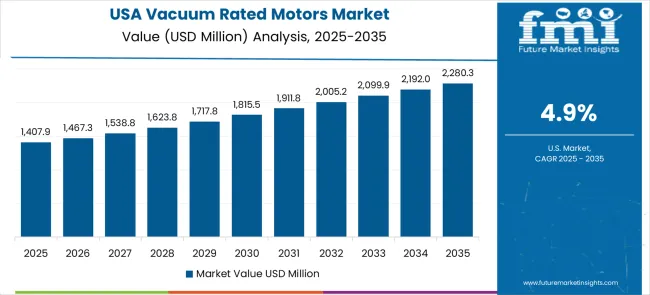
Demand for vacuum rated motors in the USA is expanding at a CAGR of 4.9%, driven by established semiconductor and aerospace industries and growing emphasis on manufacturing technology advancement. Large semiconductor manufacturers and aerospace companies are implementing comprehensive vacuum rated motor capabilities to serve diverse precision manufacturing requirements. The market benefits from established technology distribution networks and professional training programs that support various high-tech manufacturing applications. Manufacturing industry leadership is enabling standardized vacuum motor utilization across multiple precision applications, providing consistent performance effectiveness and comprehensive operational coverage throughout regional markets. Professional development and certification programs are building specialized technical expertise among manufacturing personnel, enabling effective vacuum rated motor utilization that supports evolving precision manufacturing requirements across industrial areas. The USA market is characterized by continuous technology advancement and integration with modern precision manufacturing systems. Federal technology development programs are driving procurement of sophisticated vacuum rated motor equipment that meets stringent performance and reliability standards. Semiconductor and aerospace companies are modernizing their precision manufacturing capabilities through adoption of advanced vacuum motor technology. The emphasis on manufacturing innovation and technological leadership is supporting demand for high-performance, reliable vacuum motor designs that enhance precision manufacturing while maintaining quality and efficiency standards.
Demand for vacuum rated motors in the UK is projected to grow at a CAGR of 4.4%, supported by established precision manufacturing sectors and growing emphasis on vacuum technology capabilities. British manufacturing operations and technology companies are implementing vacuum rated motor equipment that meets industry performance standards and quality requirements. The market benefits from established precision manufacturing infrastructure and comprehensive training programs for technical professionals. Manufacturing quality investments are prioritizing advanced vacuum motor equipment that supports diverse precision applications while maintaining established performance and quality standards. Professional development programs are building technical expertise among manufacturing personnel, enabling specialized vacuum rated motor operation capabilities that meet evolving precision requirements and quality standards throughout regional manufacturing networks. The United Kingdom's comprehensive manufacturing strategy and commitment to precision technology drives continued investment in advanced vacuum motor technology. Manufacturing operations across England, Wales, Scotland, and Northern Ireland are standardizing their vacuum motor equipment to ensure consistent precision manufacturing capabilities. Integration with national technology monitoring systems and coordination with quality assurance programs requires sophisticated vacuum rated motor technology. The emphasis on professional technical training and equipment certification is supporting adoption of high-quality vacuum motor systems that meet industry approval standards and operational requirements.
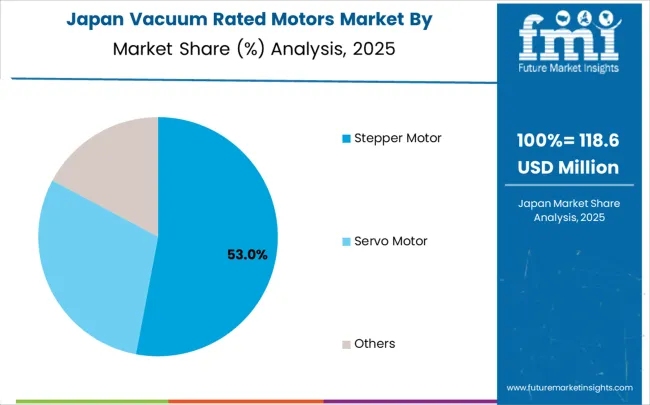
Revenue from vacuum rated motors in Japan is growing at a CAGR of 3.9%, driven by the country's focus on precision manufacturing technology refinement and quality enhancement applications. Japanese semiconductor and precision manufacturing companies are implementing advanced vacuum rated motor systems that demonstrate superior precision reliability and operational efficiency. The market is characterized by emphasis on technological excellence, quality assurance, and integration with established precision manufacturing workflows. Technology industry investments are prioritizing innovative vacuum motor solutions that combine advanced precision technology with superior quality control while maintaining Japanese engineering and reliability standards. Professional development programs are ensuring comprehensive technical expertise among manufacturing personnel, enabling specialized vacuum motor capabilities that support diverse precision manufacturing applications and operational requirements throughout metropolitan industrial networks. Japan's commitment to maintaining the highest standards of precision manufacturing and quality control drives continuous innovation in vacuum motor technology. The integration of vacuum rated motor systems with intelligent manufacturing infrastructure and automated precision networks requires sophisticated motor capabilities. Manufacturing companies across Japan's industrial regions are modernizing their precision equipment through procurement of cutting-edge vacuum rated motor technology that meets strict performance and reliability standards. The emphasis on precision engineering and technological refinement is supporting development of next-generation vacuum motor systems with enhanced precision and operational capabilities.
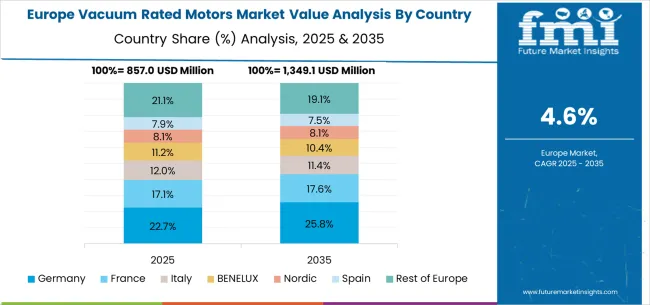
The vacuum rated motors market in Europe is anticipated to expand from USD 810.3 million in 2025 to approximately USD 1,287.1 million by 2035, reflecting a CAGR of 4.7% during the forecast period. Germany is set to reinforce its leading position, commanding a 34.2% share of the European market in 2025, supported by its established semiconductor and precision manufacturing infrastructure, high standards for operational precision, and continuous investment in advanced vacuum motor technologies. The United Kingdom follows with a market share of 17.8%, benefiting from standardized precision manufacturing procedures, professional training programs, and a robust focus on technology modernization. France is projected to capture 15.4% of the regional market, fueled by steady integration of modern vacuum motor equipment and enhancements in precision manufacturing operations. Italy and Spain together represent 19.6% of total demand, as both countries advance their precision manufacturing modernization efforts and invest in professional-grade vacuum motor solutions for technology companies. The Rest of Europe, comprising Nordic countries, BENELUX, and Eastern European markets, accounts for 13.0%, driven by regulatory convergence, infrastructure upgrading, and broader adoption of advanced vacuum rated motor technology to support evolving precision manufacturing requirements and technology development programs.
The Vacuum Rated Motors market is defined by competition among specialized motor manufacturers, precision motion control companies, and vacuum technology solution providers. Companies are investing in advanced motor design development, vacuum compatibility optimization, precision control improvements, and comprehensive service capabilities to deliver reliable, accurate, and contamination-free motion control solutions. Strategic partnerships, technological innovation, and market expansion are central to strengthening product portfolios and market presence.
Empire Magnetics offers comprehensive vacuum rated motor solutions with established manufacturing expertise and professional-grade precision control capabilities. Lin Engineering provides specialized motion control equipment with focus on stepper motor reliability and operational precision. MOONS' Industries delivers advanced motor technology solutions with emphasis on vacuum compatibility and performance optimization. Tecnotion specializes in professional linear motor systems with advanced vacuum-compatible design integration.
Sierramotion offers precision motor equipment with comprehensive vacuum performance support capabilities. MS TECHNOLOGY delivers established vacuum motor solutions with advanced precision technologies. Edwards Vacuum provides specialized vacuum equipment with focus on contamination control optimization. VAT Group, Pfeiffer Vacuum, and Leybold offer specialized manufacturing expertise, equipment reliability, and comprehensive product development across global and regional market segments.
| Item | Value |
|---|---|
| Quantitative Units | USD 3,439.8 million |
| Motor Type | Stepper Motor, Servo Motor |
| Application | Semiconductor Manufacturing, Aerospace and Military Industry |
| Regions Covered | North America, Europe, East Asia, South Asia & Pacific, Latin America, Middle East & Africa |
| Country Covered | China, India, Germany, Brazil, United States, United Kingdom, Japan, and 40+ countries |
| Key Companies Profiled | Empire Magnetics, Lin Engineering, MOONS' Industries, Tecnotion, Sierramotion, MS TECHNOLOGY, Edwards Vacuum, VAT Group, Pfeiffer Vacuum, Leybold, Kurt J. Lesker Company |
| Additional Attributes | Dollar sales by motor type and application segment, regional demand trends across major markets, competitive landscape with established vacuum motor manufacturers and emerging precision control providers, customer preferences for different motor technologies and vacuum compatibility options, integration with semiconductor fabrication systems and vacuum processing protocols, innovations in magnetic materials and contamination control technologies, and adoption of smart sensor features with enhanced precision capabilities for improved manufacturing workflows. |
The global vacuum rated motors market is estimated to be valued at USD 3,439.8 million in 2025.
The market size for the vacuum rated motors market is projected to reach USD 5,710.7 million by 2035.
The vacuum rated motors market is expected to grow at a 5.2% CAGR between 2025 and 2035.
The key product types in vacuum rated motors market are stepper motor, servo motor and others.
In terms of application, semiconductor manufacturing segment to command 58.0% share in the vacuum rated motors market in 2025.






Our Research Products

The "Full Research Suite" delivers actionable market intel, deep dives on markets or technologies, so clients act faster, cut risk, and unlock growth.

The Leaderboard benchmarks and ranks top vendors, classifying them as Established Leaders, Leading Challengers, or Disruptors & Challengers.

Locates where complements amplify value and substitutes erode it, forecasting net impact by horizon

We deliver granular, decision-grade intel: market sizing, 5-year forecasts, pricing, adoption, usage, revenue, and operational KPIs—plus competitor tracking, regulation, and value chains—across 60 countries broadly.

Spot the shifts before they hit your P&L. We track inflection points, adoption curves, pricing moves, and ecosystem plays to show where demand is heading, why it is changing, and what to do next across high-growth markets and disruptive tech

Real-time reads of user behavior. We track shifting priorities, perceptions of today’s and next-gen services, and provider experience, then pace how fast tech moves from trial to adoption, blending buyer, consumer, and channel inputs with social signals (#WhySwitch, #UX).

Partner with our analyst team to build a custom report designed around your business priorities. From analysing market trends to assessing competitors or crafting bespoke datasets, we tailor insights to your needs.
Supplier Intelligence
Discovery & Profiling
Capacity & Footprint
Performance & Risk
Compliance & Governance
Commercial Readiness
Who Supplies Whom
Scorecards & Shortlists
Playbooks & Docs
Category Intelligence
Definition & Scope
Demand & Use Cases
Cost Drivers
Market Structure
Supply Chain Map
Trade & Policy
Operating Norms
Deliverables
Buyer Intelligence
Account Basics
Spend & Scope
Procurement Model
Vendor Requirements
Terms & Policies
Entry Strategy
Pain Points & Triggers
Outputs
Pricing Analysis
Benchmarks
Trends
Should-Cost
Indexation
Landed Cost
Commercial Terms
Deliverables
Brand Analysis
Positioning & Value Prop
Share & Presence
Customer Evidence
Go-to-Market
Digital & Reputation
Compliance & Trust
KPIs & Gaps
Outputs
Full Research Suite comprises of:
Market outlook & trends analysis
Interviews & case studies
Strategic recommendations
Vendor profiles & capabilities analysis
5-year forecasts
8 regions and 60+ country-level data splits
Market segment data splits
12 months of continuous data updates
DELIVERED AS:
PDF EXCEL ONLINE
Vacuum Heat Shrink Film Market Size and Share Forecast Outlook 2025 to 2035
Vacuum Products for Emergency Services Market Size and Share Forecast Outlook 2025 to 2035
Vacuum Fiber Feedthrough Flanges Market Size and Share Forecast Outlook 2025 to 2035
Vacuum Tension Rolls Market Size and Share Forecast Outlook 2025 to 2035
Vacuum Self-priming Mobile Pumping Station Market Size and Share Forecast Outlook 2025 to 2035
Vacuum Skin Packaging Market Size and Share Forecast Outlook 2025 to 2035
Vacuum-Refill Units Market Analysis - Size and Share Forecast Outlook 2025 to 2035
Vacuum Leak Detectors Market Size and Share Forecast Outlook 2025 to 2035
Vacuum Insulation Panels Market Size and Share Forecast Outlook 2025 to 2035
Vacuum Pressure Encapsulated Transformer Market Size and Share Forecast Outlook 2025 to 2035
Vacuum Insulated Medium Voltage Switchgear Market Size and Share Forecast Outlook 2025 to 2035
Vacuum Concentrators Market Size and Share Forecast Outlook 2025 to 2035
Vacuum Insulated Low Voltage Commercial Switchgear Market Size and Share Forecast Outlook 2025 to 2035
Vacuum Pressure Impregnated (VPI) Transformer Market Size and Share Forecast Outlook 2025 to 2035
Vacuum Insulated Pipe Market Size and Share Forecast Outlook 2025 to 2035
Vacuum Therapy Devices Market Size and Share Forecast Outlook 2025 to 2035
Vacuum Pressure Swing Adsorption Market Size and Share Forecast Outlook 2025 to 2035
Vacuum Grease Market Size and Share Forecast Outlook 2025 to 2035
Vacuum Truck Market Size and Share Forecast Outlook 2025 to 2035
Vacuum Thermoformed Packaging Market Size and Share Forecast Outlook 2025 to 2035

Thank you!
You will receive an email from our Business Development Manager. Please be sure to check your SPAM/JUNK folder too.
Chat With
MaRIA